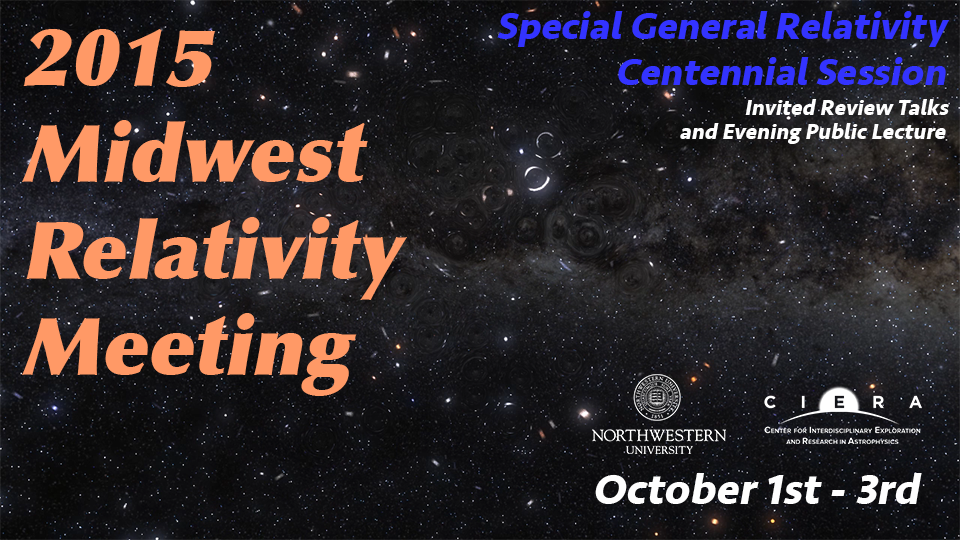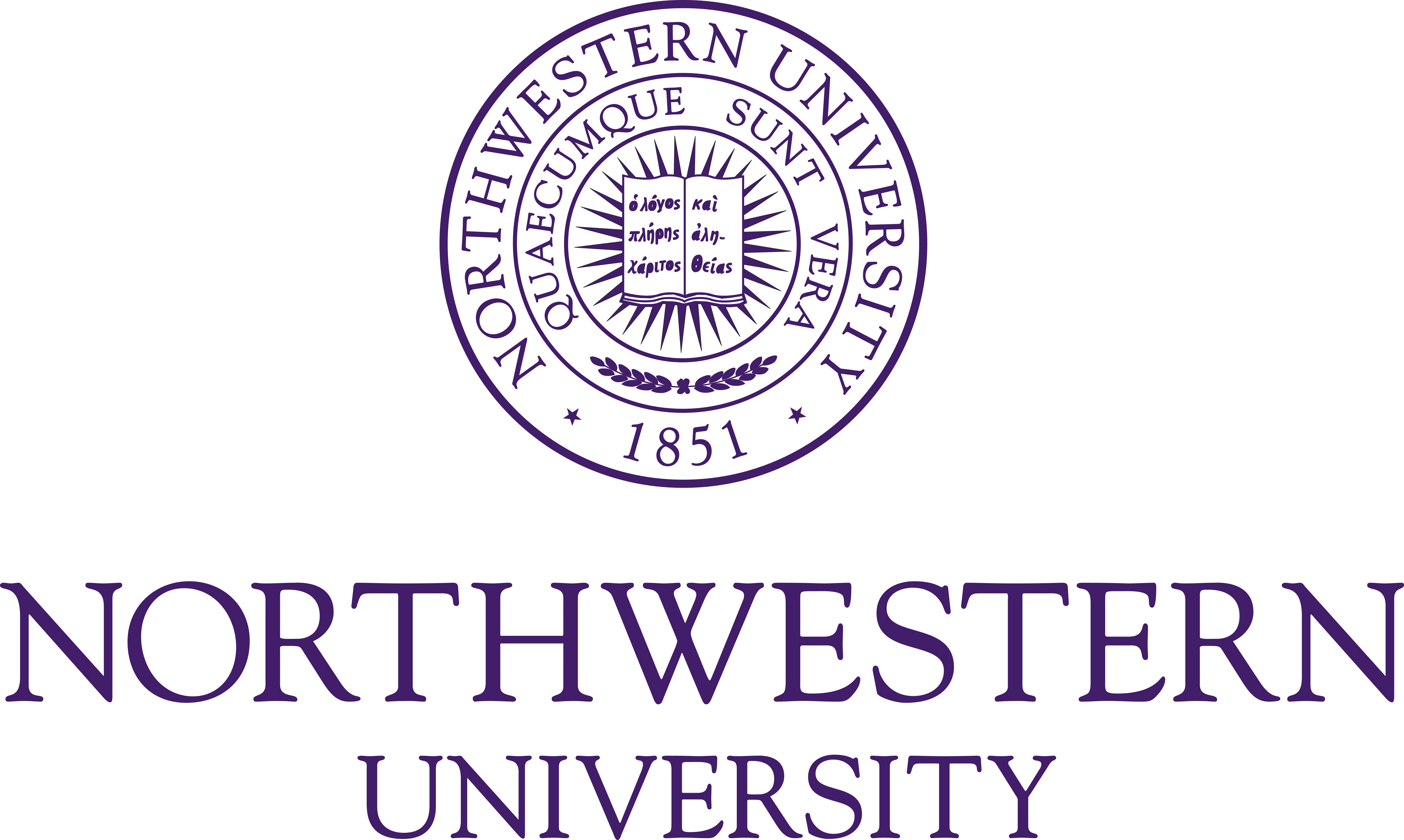Download the 2015 MRM Scientific Program (with Abstracts)
Thursday, October 1
Afternoon
Welcoming Remarks: 1:00 p.m. - 1:10 p.m.
Special General Relativity Invited Talks: 1:10 p.m. – 5:10 p.m.
Vicky Kalogera, Chair
1:10 2:00 Stu Shapiro, University of Illinois
Compact Binary Mergers as Multimessenger Sources of Gravitational Waves
2:00 2:50 Lydia Bieri, University of Michigan
Mathematical Relativity
Shane Larson, Chair
3:30 4:20 Eva Silverstein, Stanford University
Quantum gravity in the early universe and at horizons
4:20 5:10 Rainer Weiss, MIT
A brief history of gravitational waves: theoretical insight to measurement
Public lecture: 7:30 p.m. – 9:00 p.m.
7:30 9:00 John D. Norton, University of Pittsburgh
Einstein’s Discovery of the General Theory of Relativity
Friday, October 2
Morning
Gravitational Wave Sources (Morning Session One): 9:00 a.m. – 10:30 a.m.
Vicky Kalogera, Chair
9:00 9:12 Carl Rodriguez, Northwestern University
Binary Black Hole Mergers from Globular Clusters: Implications for Advanced LIGO
9:12 9:24 Thomas Osburn, UNC Chapel Hill
Computing extreme mass ratio inspirals at high accuracy and large eccentricity using a hybrid method
9:24 9:36 Eliu Huerta, NCSA, University of Illinois at Urbana-Champaign
Detection of eccentric supermassive black hole binaries with pulsar timing arrays: Signal-to-noise ratio calculations
9:36 9:48 Katelyn Breivik, Northwestern University
Exploring galactic binary population variance with population synthesis
9:48 10:00 Eric Poisson, University of Guelph
Fluid resonances and self-force
10:00 10:12 John Poirier, University of Notre Dame
Gravitomagnetic acceleration of accretion disk matter to polar jets John Poirier and Grant Mathews
10:12 10:24 Philippe Landry, University of Guelph
Tidal Deformation of a Slowly Rotating Material Body
Gravitational Wave/Electromagnetic Detections (Morning Session Two): 11:00 a.m. – 12:30 p.m.
Daniel Holz, Chair
11:00 11:12 Luis Lehner, Perimeter Institute
Electromagnetic counterparts from non-vacuum gravitational binaries
11:12 11:24 Hsin-Yu Chen, University of Chicago
Optimizing gravitational wave sources followup strategies
11:24 11:36 Huan Yang, Perimeter Institute for Theoretical Physics
Plasma wave generation in a dynamic spacetime
11:36 11:48 Archisman Ghosh, ICTS-TIFR
Prospects of estimating cosmological parameters from gravitational-wave observations of coalescing binary black holes
11:48 12:00 Zoheyr Doctor, University of Chicago
Search for Kilonovae in DES Supernova Fields
12:00 12:12 Nestor Ortiz, Perimeter Institute for Theoretical Physics
The shadow of a naked singularity.
12:12 12:24 Milton Ruiz, UIUC
Relativistic simulations of black hole-neutron star coalescence: the jet emerges
Friday, October 2
Afternoon
Numerical Relativity/Mathematical Relativity-Gravity (Afternoon Session One): 2:00 p.m. – 3:30 p.m.
Luis Lehner, Chair
2:00 2:12 John Ryan Westernacher-Schneider, University of Guelph
Forced Turbulence in Relativistic Fluids
2:12 2:24 David Garfinkle, Oakland University
Universal spike behavior in spacetime singularities
2:24 2:36 Carlos Lousto, Rochester Institute of Technology
Spin flips in generic black hole binaries
2:36 2:48 Stephen Green, Perimeter Institute for Theoretical Physics
Islands of stability and recurrence times in AdS
2:48 3:00 Eric Van Oeveren, University of Wisconsin-Milwaukee
Accelerated Scalar Self-Force on a Schwarzschild Background
3:00 3:12 Alexander Tolish, The University of Chicago
Preliminary Work Regarding Gravitational Wave Memory In An Expanding Universe
3:12 3:24 Marco Hernandez, Indiana University
Gravitational field equations and long range repulsive effect
Mathematical Relativity-Mathematical Methods (Afternoon Session Two): 4:00 p.m. – 5:30 p.m.
Robert Wald, Chair
4:00 4:12 Jim Wheeler, Utah State University
Time in conformal general relativity
4:12 4:24 Jeffrey Hazboun, Hendrix College
A Cartan geometry approach to the AdS/CFT correspondence
4:24 4:36 Benjamin Lovelady, Utah State University
Dynamical internal symmetry: a Yang-Mills field on biconformal space
4:36 4:48 Tevian Dray, Oregon State University
The Geometry of Relativity
4:48 5:00 Morgan Lynch, University of Wisconsin-Milwaukee
Aspects of accelerated quantum dynamics
5:00 5:12 Weishun Zhong, University of Michigan-Ann Arbor
Holographic c-Theorem in Schrodinger Spacetime
5:12 5:24 Mohammad Akbar, University of Texas at Dallas
Lie point symmetries of static axisymmetric vacuum Einstein equations
Saturday, October 3
Morning
Mathematical Relativity-Gravity (Morning Session One): 8:30 a.m. – 10:30 a.m.
David Garfinkle, Chair
8:30 8:42 Richard Kriske, University of Minnesota
Revisiting the Horizon
8:42 8:54 Vic Dannon, Gauge Institute
The Sun's Orbit Radius and Period
8:54 9:06 Greg Proper, Proper Eng.
An Alternative to the Robertson-Walker Metric and the Accelerated Expansion of Space-Time
9:06 9:18 Paul O’Brien
Black Hole Enthalpy and the Bekenstein Bound
9:18 9:30 Kartik Prabhu, University of Chicago
First law and entropy for charged fields
9:30 9:42 Sam Gralla, University of Arizona
Physics near Rapidly Spinning Black Holes
9:42 9:54 Soichiro Isoyama, University of Guelph
Hamiltonian Dynamics of Self-Forced Motion in Kerr Spacetime: Inspiral-Dynamics
9:54 10:06 Robert Wald, University of Chicago
Instability of AdS Black Holes with Ergoregions
10:06 10:18 Shouhong Wang, Indiana University
A new blackhole theorem and its applications to cosmology and astrophysics
10:18 10:30 Shuang-Yong Zhou, Case Western
The strong coupling scale of massive gravity
Gravitational Wave Experiments & Alternative Tests (Morning Session Two): 11:00 a.m. – 12:30 p.m.
Patrick Brady, Chair
11:00 11:12 Frank Barrett, Grand Valley State University
Spurious Noise Acceleration of LISA Spacecraft Due to Solar Wind
11:12 11:24 Brandon Piotrzkowski, Grand Valley State University
Spurious Acceleration Noise on the LISA Configuration Due to Solar Irradiance
11:24 11:36 Brittany Kamai, Vanderbilt University
The Fermilab Holometer as a gravitational wave antenna
11:36 11:48 Michael Zevin, Northwestern University
LIGO Glitch Classification using Machine Learning Algorithms
11:48 12:00 Peter Zimmerman, University of Arizona
Gravitational self-force in scalar-tensor theories
12:00 12:12 Rui Xu, Indiana University, Bloomington
Searching for Lorentz violation using gravitational effective field theory
12:12 12:24 Jonah Miller, Perimeter Institute for Theoretical Physics
Testing Gravitational Aether Theory Through the Astrophysics of Compact Objects
Saturday, October 3
Afternoon
Blue-Apple Award: 2:00 p.m. – 2:10 p.m.
Alternative Tests, Gravitational Wave Data, and Mathematical Relativity-Mathematical Methods (Afternoon Session): 2:00 p.m. – 3:45 p.m.
Shane Larson, Chair
2:10 2:22 Raissa Mendes, University of Guelph
Possibility of setting a new constraint to scalar-tensor theories
2:22 2:34 Tigran Kalaydzhyan, UIC
Testing gravity on accelerators
2:34 2:46 Chris Pankow, Northwestern University
A Rapid Bayesian Parameter Estimation Scheme for Binary Neutron Stars in the Advanced LIGO Era
2:46 2:58 Laura Sampson, Northwestern University
Astrophysical Inference with Pulsar Timing Arrays
2:58 3:10 Scotty Coughlin, Northwestern University
Distinguishing Neutron Stars from Black Holes with LIGO/Virgo
3:10 3:22 Roberto Salgado, UWisconsin-La Crosse
Relativity on Rotated Graph Paper: Lorentz-Invariant Calculations with Causal Diamonds
3:22 3:34 George Hrabovsky, Madison Area Science and Technolgy (MAST)
Solving the Field Equations of General Relativity in Mathematica | 




